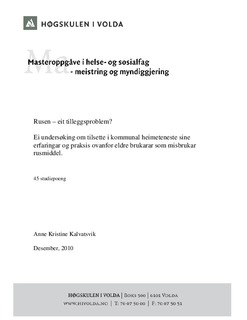| dc.description.abstract | Summary
The main purpose of this survey has been to gather new knowledge concerning the employees of the municipal home services, and their experience and practice regarding elderly clients who are substance abusers. The survey was carried out using qualitative methodologies, and managers, home nurses and home helpers from the home care services in three different municipalities have been interviewed.
The findings show that employees in home services face many challenges when working with elderly abusers. Their everyday life can become dominated by uncertainty; feeling unsafe and uncertain about how to respond when users are affected by their abuse. Findings in this study shows also that men and women have different abuse patterns, and that some of the men in particular are subjected to stigmatization from both the community and from health professionals. Findings further suggest there was a lack of knowledge about drugs and drug abuse among employees working with this group of elderly clients, and personal experience was stated to be the main source of knowledge in relation to handling challenges. None of the municipalities in the study had dedicated plans or guidelines regarding substance abuse among elderly clients. Day-to-day practice was influenced by the health professionals’ own thinking, and could generally be described as lacking interdisciplinary cooperation. Thus the employees in home services were often left alone to handle drug related problems, despite their lack of knowledge. In Lien and in Fjorden, some interdisciplinary cooperation has been initiated, and this was reported as an important resource in their practices.
The knowledge developed in this study may be useful to further develop the quality of homebased services. My findings imply that the home services lack competence in relation to substance abuse. In addition, that it would strengthen the services if social thinking could be more included into the practice. Interdisciplinary collaboration should be a priority, within the services and between services in neighboring municipalities. Thus, elderly substance abusers could receive a more holistic care, covering more than just the health aspects of the abuse. | en_US |
